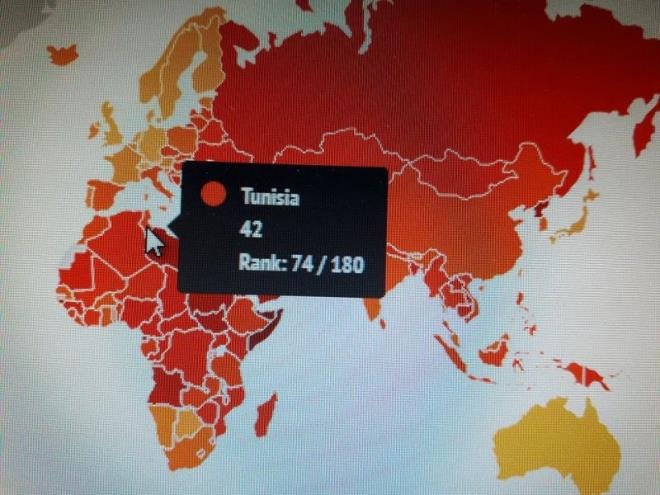Tunisia was ranked 74th out of 180 countries with a score of 42 points, by the new Corruption Perceptions Index (CPI) for 2017. It only gained one point over the year the latest (41 points in 2016 and 42 in 2017), according to the new Transparency International report, which revealed, this year, that more than two thirds of countries score less than 50, with an average score of 43.
Tunisia is leading the Maghreb countries, with Morocco ranked in 81st place (40 points), Algeria in 112th place (33 points), Mauritania in 143rd place (28 points) and Libya at 171st place (17 points).
The performance of Tunisia is worse than that of other Arab countries such as the United Arab Emirates (21st with 71 points), Qatar (29th with 63 points), Saudi Arabia (57th with 49 points) and the Sultanate of Oman (68th with 44 points), according to this index which ranks 180 countries and territories according to their perceived levels of public sector corruption according to experts and businessmen using a scale from 0 to 100, where 0 is highly corrupted and 100 is very clean.
President of the organisation “I Watch” Ashraf Aouadi, a NGO that announced Wednesday, this new ranking at a meeting co-organised in Tunis, with Transparency International Tunisia, called a “disappointment”, the score of Tunisia in view of the measures put in place and aimed at combating corruption in recent years “.
He explained, however, that “the analysis of the situation in Tunisia reveals the continuity of old practices such as recruitment based on favoritism and cronyism, mismanagement of public funds and money laundering”.
According to the president of “I Watch”, a Tunisian NGO that fights against corruption and works for transparency, Tunisia is called to accelerate the development of legislation and to guarantee the independence of the judiciary and the public sector control aithorities. also to promote the role of the courts in deciding on corruption cases.
The novelty of the 2017 report is the more in-depth analysis of Transparency International, which shows that journalists and activists in corrupt countries risk their lives every day. He found that almost all journalists killed since 2012 have been killed in corrupt countries.
“No activist or journalist should have to fear for his life when he speaks out against corruption,” said Patricia Moreira, Executive Director of Transparency International, quoted in a statement on the NGO’s website. “Given the current crackdown on civil society and the media around the world, we must do more to protect those who speak.”
At the international level, the least corrupt countries in the world are New Zealand, 1st, followed by Denmark (2nd) and Finland (3rd).
Syria (178th), South Sudan (179th) and Somalia (180th) closed the march on this TI index, published Wednesday, February 21st, 2018.
Transparency International, which is celebrating its 25th anniversary this year, revealed in its report that “despite attempts to fight corruption around the world, the majority of countries are moving too slowly in their efforts. The fight against corruption takes time, over the last six years many countries have made little or no progress.
More alarmingly, a more in-depth analysis of the index’s results indicates that countries with the lowest protection for news organisations and non-governmental organisations (NGOs) also tend to have the lowest rates of corruption. »
The report also reveals that over the past six years, several countries have significantly improved their score Corruption Perception Index (CPI). These include Ivory Coast, Senegal and the United Kingdom, while several countries have declined, including Syria, Yemen and Australia.
TunisianMonitorOnLine (Source:TAP)




